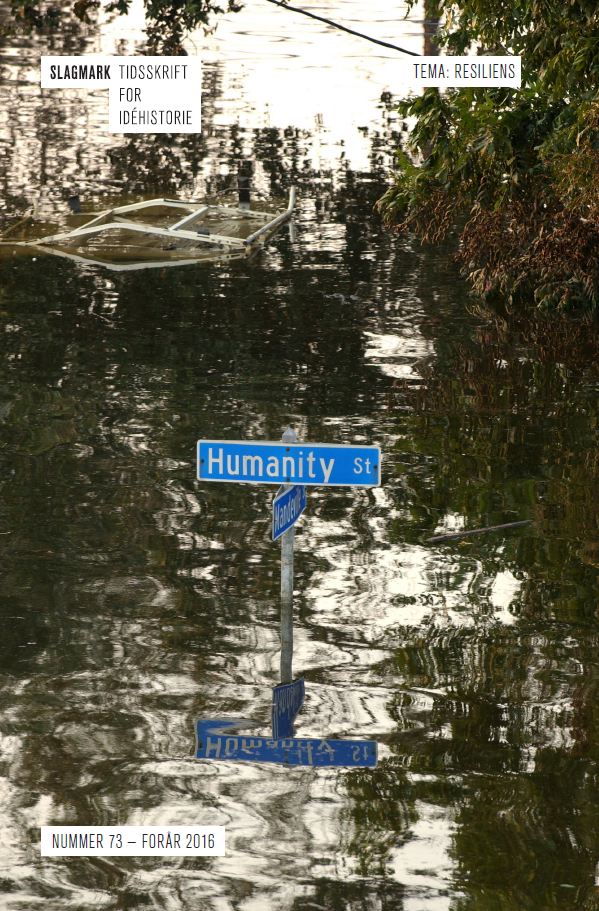Resilient retfærdighed?
Klimabevægelsen og den systemiske retorik
DOI:
https://doi.org/10.7146/sl.v0i73.107234Keywords:
climate justice, social movements, resilience, contemporary historyAbstract
This article uses the idea of resilience as a point of departure for analysing some contemporary challenges to the climate justice movement posed by social-ecological sciences. Climate justice activists are increasingly rallying for a system-change, demanding fundamental changes to political bureaucracy and the economy, which would put ecology, biodiversity and climate change first for all future political decisions. Since the concept of resilience has taken up a central role in recent developments in ecological sciences, it has also become part of the activist debate. The article’s main argument is that the scientific framework behind resilience is not politically neutral and that this framework tends to weaken the activist’s demands for a just transition and place more emphasis on technical and bureaucratic processes.
References
Boyd, E. & C. Folke (2012). Adapting Institutions: Governance, Complexity, and Social-ecological Resilience. Cambridge: Cambridge University Press.
Bullard, R. D. (1992). The Quest for Environmental Equity: Mobilizing the African-American Community for Social Change. I R. E. Dunlap, & A. G. Mertig, (red.) American Environmentalism: the U.S. environmental movement, 1970-1990. New York: Taylor & Francis.
Chameides, B. (2014). A Look at Environmental Justice in the United States Today. Huffington Post, 22. Marts.
Cote, M., & A. J. Nightingale (2011). Resilience Thinking Meets Social Theory: Situating Social Change in Socio-ecological Systems (SES) Research. Progress in Human Geography 36(4), 475-89.
Dawson, A. (2010). Climate Justice: The Emerging Movement against Green Capitalism. South Atlantic Quarterly 109(2), 313-38.
De Chiro, G. (2015). Environmental justice and the Anthropocene Meme. I T. Gabrielson, C. Hall, & J. M. Meyer (red.). The Oxford Handbook of Environmental Political Theory. Oxford: Oxford University Press.
Dietz, M. (2013). Routledge Handbook of the Climate Change Movement. London: Taylor & Francis.
Galaz, V., D. Galafassi, J. Tallberg, A. Boin, E. Hey, C. Ituarte-Lima, J. Dunagan, P. Olsson, R. Österbergh & F. Westley (2014). Connected Risks, Connected Solutions. Stockholm: Stockholm Resilience Centre, Stockholm University, and the Global Challenges Foundation.
Geden, O. (2016). An Actionable Climate Target. Nature Geoscience. No. 04, 2016. Goldenberg, Suzanne (2014, 31. marts). Climate change: the poor will suffer most. The Guardian. Hentet fra: http://www.theguardian.com/environment/2014/mar/31/climate-change-poor-suffer-most-un-report.
Jackson, R. B. m.fl. (2016). Reaching Peak Emissions. Nature Climate Change Nature Climate Change 6 (1), 7-10.
Johnson, G. S. (2001). Robert Bullard. I J. F. Mongillo, & B. Booth (red.) Environmental Activists. Westport: Greenwood Publishing Group.
Klein, N. (2013). How science is telling us all to revolt. New Statesman. 29 October.
Klein, N. (2008). The Shock Doctrine: The Rise of Disaster Capitalism. New York: Picador.
Klein, N. (2014). This Changes Everything: Capitalism vs. the Climate. New York: Penguin.
Hajer, M. & W. Versteeg (2011). Voices of Vulnerability: The Reconfiguration of Policy Discourses. I J. Dryzek & R. B. Norgaard (red.). Voices of Vulnerability. The Oxford Handbook of Climate Change and Society. Oxford: Oxford University Press.
Malm, A., Hornborg A. (2014). The Geology of Mankind? A Critique of the Anthropocene Narrative. The Anthropocene Review. 1(1), 62-69.
McKibben, B. (2010). Eaarth: Making a Life on a Tough New Planet. New York: Times Books.
Mesjasz, C. (2011). Economic Vulnerability and Economic Security. I H. G. Brauch (red.). Coping with Global Environmental Change, Disasters and Security: Threats, Challenges, Vulnerabilities and Risks. Berlin: Springer.
Müller, T. (2014). “Degrowth: a tale of two movements”, Eco-instigator. No. 5, 32-36.
Nash, L. (2006). Inescapable ecologies: a history of environment, disease, and knowledge. Berkeley: University of California Press.
Newell, P. & M. Paterson (2010). The Politics of the Carbon Economy” i Boykoff & Newell (2012). Globalization and the Environment: Capitalism, Ecology and Power. Cambridge: Polity Press
Maxwell T. (red.). The Politics of Climate Change: A Survey. London: Routledge.
Pleyers, G. (2010). Alter-globalization: Becoming actors in the global age. Cambridge: Polity.
Rockström, J. (2010). Planetary Boundaries. New Perspectives Quarterly 27(1), 72-74.
Swyngedouw, E. (2014). Anthropocenic Politicization. I J. Hedrén & K. Bradley (red.), Green Utopianism. (23-37). New York: Routledge.
Stockholm Resilience Centre (2015). Tipping towards the unknown. Hentet fra: http://www.stockholmresilience.org/21/research/research-news/2009-09-23-tipping-towards-the-unknown.html
Stockholm Resilience Centre (2015). What is resilience? Hentet fra: http://www.stockholmresilience.org/21/research/research-news/2-19-2015-what-is-resilience.html
Sze, J. (2007). Noxious New York: The Racial Politics of Urban Health and Environmental Justice. Cambridge: MIT.
Tokar, B. (2010). Toward Climate Justice: Perspective on the Climate Crisis and Social Change. Porsgrunn: Communalism.
Walker, J. & M. Cooper (2011). Genealogies of resilience: From systems ecology to the political economy of crisis adaptation. Security Dialogue. 42(2), 143-160.
WHO (2013). Climate change and health. Fact sheet N°266. Hentet fra: http://www.who.int/mediacentre/factsheets/fs266/en/350.org (2016). What we do. Hentet fra: http://350.org/about/what-we-do/





